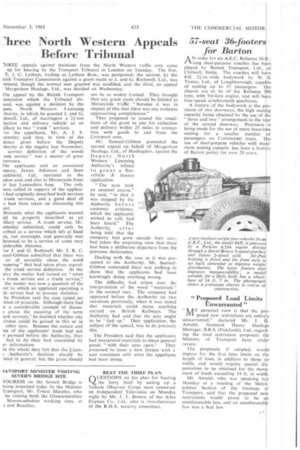7hree North Western Appeals Before Tribunal
Page 39

If you've noticed an error in this article please click here to report it so we can fix it.
'HREE appeals against decisions from the North Western traffic area came up for hearing by the Transport Tribunal in London on Tuesday. The first, E. J. C. Lytham, trading as Lytham Bros., was postponed; the second, by the [fish Tratisport Commission against a grant made to J. and 0, Rothweil. Ltd., was missed, though the normal user granted was modified, and the third, an appeal Margerison Haulage, Ltd., was decided on Wednesday.
The appeal by the British Transport mmission which the Tribunal disssed, was against a decision by the puty North Western Licensing thority, in which he granted J. and G. thwell, Ltd., of Accrington a 21-ton lection ahd delivery vehicle as an ;illary to two " trunk " services.
7or the appellants, Mr. A. J. F.
• ottesley said that, in view of the dence given before the Deputy thority at the inquiry last November, correct definition of the words -unk service" was a matter of great iartance.
[he applicants and an associated npany, James Atkinson and Sons ackburn), Ltd., operated to the [Won area and also to Merseyside from
ir last Lancashire base. The only ness called in support of the applicaI had originally described both services trunk services, and a -good deal of
e had been taken up discussing this ect.
Riviously what the applicants wanted ild be properly described as an :Mary service. A trunk service, Mr. ottesley submitted, could only be cribed as a service which left at fixed es, ran overnight, and generally was lerstood to be a service of some very isiderable distance.
7or J. and G. Rothwell, Mr. J. R. C. nuel-Gibbon submitted that there was air of unreality about the word lopping" that had taken place regardthe trunk service definition. At the ffiry the matter had turned on "when J. trunk service not a trunk service," the matter was now a question of the nit to which an applicant operating a lk service had to present statistics. he President said the case raised no .stion of principle. Although there had
n a considerable amount . of discus1 about the meaning of the term unk services," he doubted whether any stance could be gained in this or in other case, Because the nature and mt of the applicants' trade had not n pursued before the Authority, they had to do. their best unassisted by er ,information. •
In the whole they felt that the Licen; Authority's decision should: be -riledin general, but 'thegrant should
not be so widely framed. They thought that any grant made should be limited to Merseyside traffic "because it was in respect of this that there was any evidence approaching completeness."
They proposed• to amend the conditions of the grant to one for collection and delivery within 25 miles in connection with goods to and from the Liverpool area.
Mr. Samuel-Gibbon presented the second appeal on behalf of Margerison Haulage, Ltd., of Haslingdon, against the Deputy North Western Licensing Authority's refusal to grant a fivevehicle A licence application.
The case took an unusual course," he said, "in that it was stopped by the Authority before customer evidence, which the applicants wished to call, had been heard." The Authority, after being told that the company had gone. outside their user, had taken the surprising view that there had been a deliberate departure from the previous declaration.
Dealing with the case as it was presented to the Authority, Mr. SamuelGibbon contended there was nothing to show that the applicants had been knowingly doing anything wrong.
The difficulty had arisen over the interpretation of the word " materials " in the normal user, The company had appeared before the Authority on two occasions previously, when it was stated that materials could mean anything carried on British Railways. The Authority had said that the user ought to be "tied up." Their application, the subject of the appeal, was to do precisely this.
The President said that the applicants had interpreted materials to mean general goods "with their eyes open." They proposed to issue a new licence with a user consistent with what the appellants had been doing.
























































































































